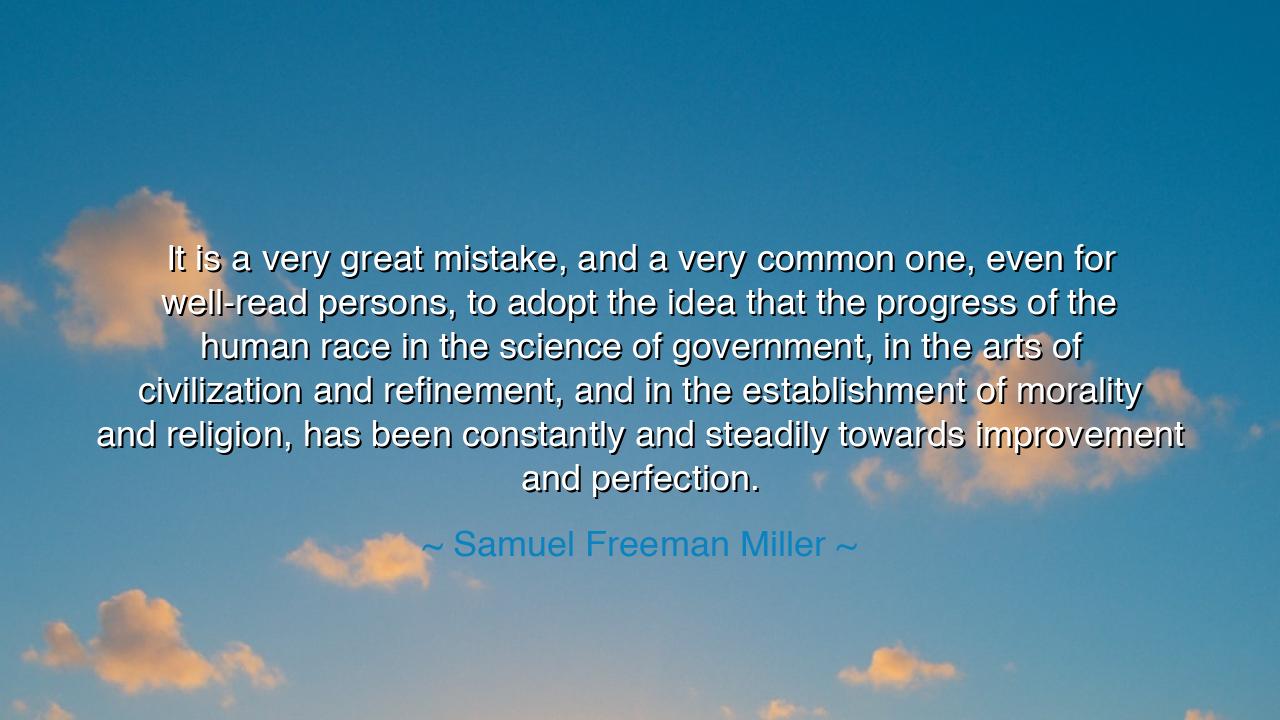
It is a very great mistake, and a very common one, even for
It is a very great mistake, and a very common one, even for well-read persons, to adopt the idea that the progress of the human race in the science of government, in the arts of civilization and refinement, and in the establishment of morality and religion, has been constantly and steadily towards improvement and perfection.






The words of Samuel Freeman Miller, a Justice of the United States Supreme Court during the turbulent years following the Civil War, carry a timeless wisdom that cuts through the illusions of human pride: “It is a very great mistake, and a very common one, even for well-read persons, to adopt the idea that the progress of the human race in the science of government, in the arts of civilization and refinement, and in the establishment of morality and religion, has been constantly and steadily towards improvement and perfection.” In this statement, Miller warns us against the seductive myth of inevitable progress—the belief that time alone purifies humanity, that every generation is wiser and more virtuous simply by virtue of being modern. His words remind us that civilization does not ascend by destiny but by discipline—and that moral decline often hides beneath the glitter of advancement.
This quote emerged from a mind forged in the fires of one of America’s most defining struggles—the Civil War, when the nation’s faith in progress was shattered by the sight of brother killing brother. Miller lived through an age when men boasted of science, industry, and political enlightenment, yet allowed slavery, greed, and cruelty to thrive in their midst. He saw firsthand that technological progress does not equal moral progress, and that without spiritual and ethical foundation, even the most advanced societies can sink into barbarism. Thus, his warning was not merely historical—it was prophetic.
Throughout history, the illusion of constant improvement has been humanity’s most dangerous comfort. The Athenians, at the height of their culture, believed themselves too civilized to fall—yet corruption and pride destroyed their democracy. The Romans, masters of law and engineering, believed their empire eternal—until decadence devoured its strength. The Europeans of the 20th century, standing atop the wonders of science and art, declared that mankind had entered an age of enlightenment—and yet that same century witnessed two world wars, genocide, and the mechanization of death. Each believed themselves to be living at the pinnacle of progress, and each was humbled by their own hubris.
Miller’s message pierces through every age: progress is not a straight line—it is a fragile flame. It flickers and fades when vigilance is lost. Civilization rises not because man invents, but because he restrains; not because he learns, but because he remembers. The true measure of progress is not in wealth or power or comfort, but in the conscience of a people—their justice, their compassion, their courage to do what is right even when the world rewards what is easy. When morality and humility falter, even the grandest societies return to dust.
There is a story that mirrors this truth: the fall of Weimar Germany. After World War I, Germany became one of the most intellectually and culturally advanced nations in the world. Its universities were the envy of Europe, its artists reshaping modern thought, its scientists pioneering new frontiers. Yet within a single generation, that same society embraced tyranny, racism, and violence on a scale previously unimaginable. How could a nation so advanced fall so far? Because knowledge without wisdom is perilous, and comfort without virtue breeds blindness. They mistook progress for goodness—and paid the price in blood.
Miller’s warning thus reaches beyond history—it speaks to every generation that worships technology, wealth, or innovation as proof of moral advancement. The modern world, too, risks repeating the same folly. We send machines to the stars, yet fail to govern our tempers; we connect the world through information, yet drift further apart in truth. Our tools have evolved—but have our hearts? The Justice’s words whisper that without the inner progress of the spirit, every outer triumph is but a mirage.
The lesson is clear: do not mistake motion for growth, nor advancement for virtue. The progress of humanity depends not on time, but on choice. Each age must earn its enlightenment anew—through humility, justice, and truth. To build a better world, one must cultivate the inner sciences of conscience and character as diligently as the outer sciences of power.
So let us remember Samuel Freeman Miller’s wisdom: the march of civilization is not inevitable—it is conditional. Every generation stands on the edge between refinement and ruin. If we forget the foundations of morality and faith, all our progress becomes peril. But if we remember them—if we choose discipline over arrogance, reflection over pride—then the true light of progress will not flicker, but burn brighter with each passing age.






AAdministratorAdministrator
Welcome, honored guests. Please leave a comment, we will respond soon